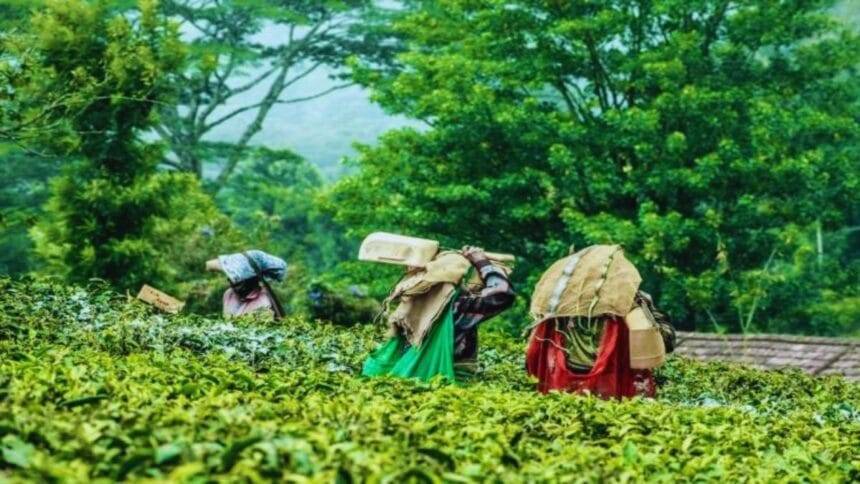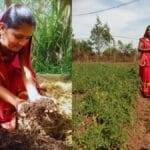Main Points In Hindi (मुख्य बातें – हिंदी में)
-
चाय उत्पादन का विस्तार: बिहार में चाय उत्पादन को बढ़ावा देने के लिए सरकार ‘चाय विकास योजना’ शुरू कर रही है, जिससे किसान चाय की खेती में जुड़ रहे हैं। इस योजना का उद्देश्य किसानों की आय को दोगुना करना है।
-
सब्सिडी संरचना: बिहार सरकार किसानों को चाय की खेती के लिए प्रति हेक्टेयर 50% सब्सिडी प्रदान कर रही है। चाय की खेती की कुल लागत 4.94 लाख रुपये प्रति हेक्टेयर निर्धारित की गई है, जिसमें से किसान को 2.47 लाख रुपये की सब्सिडी दी जाएगी।
-
नियम और शर्तें: इस योजना के तहत केवल वे किसान लाभ उठा सकते हैं जिन्होंने पिछले साल नई चाय की पौधें लगाई हैं। दूसरी किस्त का भुगतान तभी किया जाएगा जब लगभग 90% नई पौधों की जीवित रहने की दर 2024-25 तक साबित हो जाएगी।
-
चाय की खेती के लिए उचित परिस्थितियाँ: चाय की खेती के लिए ठंडा और नम वातावरण, और रेतीली दोमट मिट्टी सबसे उपयुक्त मानी जाती है। चाय के पौधों को बीजों या कटिंग्स से उगाया जाता है और इसके लिए सही तापमान 13°C से 28-32°C के बीच होना चाहिए।
- ऑनलाइन आवेदन की प्रक्रिया: इच्छुक किसान विशेष बागवानी फसल योजना के तहत ऑनलाइन आवेदन कर सकते हैं। अधिक जानकारी के लिए किसान बिहार बागवानी विभाग की वेबसाइट पर जा सकते हैं या नजदीकी जिले के सहायक निदेशक से संपर्क कर सकते हैं।
Main Points In English(मुख्य बातें – अंग्रेज़ी में)
Here are the main points regarding the tea cultivation initiative in Bihar under the "Tea Development Scheme":
-
Promotion of Tea Cultivation: The Bihar government is actively promoting tea cultivation among farmers to increase their income, similar to regions like Assam, Darjeeling, and Jammu and Kashmir, which are already famous for their tea.
-
Subsidy Details: Under the Tea Development Scheme, farmers will receive a 50% subsidy for tea cultivation expenses. The total unit cost per hectare is set at ₹4,94,000, meaning farmers can receive up to ₹2,47,000 per hectare as subsidy.
-
Survival Rate Condition: Farmers who planted new tea plants in the previous season are eligible for the scheme. To receive the second installment of the subsidy, at least 90% of the newly planted tea plants must survive by the end of the 2024-25 season.
-
Ideal Conditions for Tea Cultivation: Tea plants thrive in a cool and moist climate with sandy loam soil. Optimal temperatures for growth range from 13°C to 28-32°C, and cultivators should begin planting immediately after the monsoon.
- Application Process: Interested farmers can apply online for the scheme through the Bihar Horticulture Department’s portal and must complete the Direct Benefit Transfer (DBT) registration to receive their grant.


Complete News In Hindi(पूरी खबर – हिंदी में)
इस समय, भारत के विभिन्न राज्यों में उगाए जा रहे चाय की अंतर्राष्ट्रीय स्तर पर अच्छी पहचान बनी हुई है। असम, गुवाहाटी, दार्जिलिंग और जम्मू-कश्मीर के लोग चाय के प्रति बहुत उत्साही थे, अब बिहार का नाम भी इस सूची में जोड़ दिया गया है। वास्तव में, बिहार के किसानों की आय को दोगुना करने के लिए सरकार बागवानी और वाणिज्यिक फसलों की खेती को बढ़ावा दे रही है। इसी के तहत, “चाय विकास योजना” के अंतर्गत, सरकार चाय के क्षेत्र को बढ़ाने और अधिक से अधिक किसानों को चाय खेती से जोड़ने के लिए बड़ी मात्रा में सब्सिडी प्रदान कर रही है। आइए जानें कि आवेदन कैसे करें और इस योजना का लाभ कैसे उठाएं।
आपको कितनी सब्सिडी मिलेगी?
“चाय विकास योजना” के अंतर्गत, बिहार सरकार चाय की खेती के लिए किसानों को कृषि विभाग द्वारा 50 प्रतिशत सब्सिडी दे रही है। इस योजना में, बागवानी विभाग ने चाय की खेती के लिए प्रति हेक्टेयर लागत 4 लाख 94 हजार रुपये तय की है। ऐसे में, किसानों को लागत का 50 प्रतिशत यानी 2 लाख 47 हजार रुपये प्रति हेक्टेयर सब्सिडी दी जा रही है। इसके साथ ही, इस योजना के तहत 150 हेक्टेयर में चाय की खेती का लक्ष्य निर्धारित किया गया है।
बिहार में #Tea Development Scheme के तहत, किसानों को चाय की खेती के विस्तार और प्रबंधन के लिए उपकरणों पर सब्सिडी दी जा रही है। इससे किसानों की आय में वृद्धि होगी और कृषि में सुधार होगा। @mangalpandeybjp @SanjayAgarw_IAS @abhitwittt @BametiBihar @AgriGol @Agribih #BiharAgriculture pic.twitter.com/yl9ez5wdht
— Directorate Of Horticulture, Deptt of Agri, Bihar (@HorticultureBih) November 4, 2024
सरकार ने यह शर्त निर्धारित की है
बिहार में चाय की खेती को बढ़ावा देने के लिए सरकार द्वारा योजना चलाई जा रही है। इस योजना के तहत सरकार ने एक शर्त भी तय की है। केवल उन किसानों को इस योजना का लाभ मिलेगा जिन्होंने पिछले साल के मौसम में नए चाय के पौधे लगाए हैं। इस योजना के अंतर्गत, दूसरे किश्त के लिए पैसे तभी मिलेंगे जब 2024-25 तक लगभग 90 प्रतिशत नए लगाए गए चाय के पौधे जीवित रहेंगे। इस योजना के तहत, लाभार्थी किसानों का चयन जिले द्वारा निर्धारित लक्ष्य के आधार पर किया जाएगा।
चाय की खेती कैसे करें
चाय की खेती के लिए ठंडा और नम जलवायु आवश्यक है। साथ ही, चाय के पौधों के लिए बालू वाली दोमट भूमि सबसे उपयुक्त मानी जाती है। चाय के पौधों की वृद्धि के लिए 13 °C से 28-32 °C के बीच का तापमान सबसे अच्छा होता है। चाय के पौधों को बीजों या कटिंग से उगाया जा सकता है। बीजों से चाय की वृद्धि में कम से कम तीन वर्ष लगते हैं। इसके अलावा, चाय की खेती मानसून के तुरंत बाद करनी चाहिए। साथ ही, कृषि के पूर्व, खेत की जुताई की जानी चाहिए। इसके बाद, खेत में गोबर और खाद डालें, फिर बीज या पौधे लगाएं।
यहाँ आवेदन करें
इच्छुक किसान विशेष बागवानी फसल योजना के तहत ऑनलाइन आवेदन कर सकते हैं। यदि किसान चाहें, तो वे बिहार बागवानी विभाग के पोर्टल पर भी जा सकते हैं। horticulture.bihar.gov.in पर जाकर ऑनलाइन आवेदन कर सकते हैं। इसके साथ ही, इस योजना से संबंधित अधिक जानकारी के लिए, वे अपने निकटतम जिले के सहायक निदेशक बागवानी से भी संपर्क कर सकते हैं। इस योजना के लाभार्थी किसानों को अनुदान राशि DBT के माध्यम से प्राप्त होगी, इसलिए किसानों को पहले DBT पंजीकरण कराना होगा।
Complete News In English(पूरी खबर – अंग्रेज़ी में)
At present, tea grown in different states of India is quite famous all over the world. In India, people of Assam, Guwahati, Darjeeling and Jammu and Kashmir were crazy about the tea, now the name of Bihar has also been added to this list. In fact, to double the income of the farmers of Bihar, the government is promoting the cultivation of horticulture and commercial crops. At the same time, under the “Tea Development Scheme”, the government is giving bumper subsidy to expand the tea area and connect more and more farmers to tea cultivation. Let us know where to apply and how to avail the benefits of the scheme.
How much subsidy will you get?
Under “Tea Development Scheme”, Bihar Government is giving 50 percent subsidy to the farmers for tea cultivation by the Horticulture Department. In this, the Horticulture Department has fixed the unit cost per hectare of tea cultivation at Rs 4 lakh 94 thousand. In such a situation, farmers are being given 50 percent subsidy of the cost i.e. Rs 2 lakh 47 thousand per hectare. At the same time, under this scheme, a target has been set to cultivate tea in 150 hectares.
in bihar #Tea Development Scheme Under this, farmers are being given subsidy on equipment for expansion and management of tea cultivation. This will increase the income of farmers and improve farming. @mangalpandeybjp @SanjayAgarw_IAS @abhitwittt @BametiBihar @AgriGol @Agribih #BiharAgriculture pic.twitter.com/yl9ez5wdht
— Directorate Of Horticulture, Deptt of Agri, Bihar (@HorticultureBih) November 4, 2024
The government has set this condition
A scheme is being run by the government to promote tea cultivation in Bihar. The government has also set a condition for this. Only those farmers who have planted new tea plants in the last year’s season will be given the benefit of this scheme. Under this scheme, the money for the second installment will be available only when about 90 percent of the newly planted tea plants survive by 2024-25. Under this scheme, the beneficiary farmers will be selected on the basis of the target set by the district.
Cultivate tea like this
Tea cultivation requires cool and moist climate. At the same time, sandy loam soil is best for growing tea plants. For growing tea plants, a temperature between 13 °C to 28-32 °C is considered best. The tea plant is grown from seeds or cuttings. It takes at least three years to grow tea from seed. Also, tea cultivation should be done immediately after monsoon. At the same time, the field should be plowed before its cultivation. After this, put cowdung and manure in the field. After this plant the seeds or lotus.
You can apply here
Interested farmers can apply online under the Special Horticulture Crop Scheme. If farmers wish, they can visit the portal of Bihar Horticulture Department. horticulture.bihar.gov.in You can apply online on the link. At the same time, for more information related to this scheme, you can also contact the Assistant Director of Horticulture of the nearest district. The grant amount will be sent to the beneficiary farmers of this scheme through DBT, hence the farmers will have to do DBT registration first.




